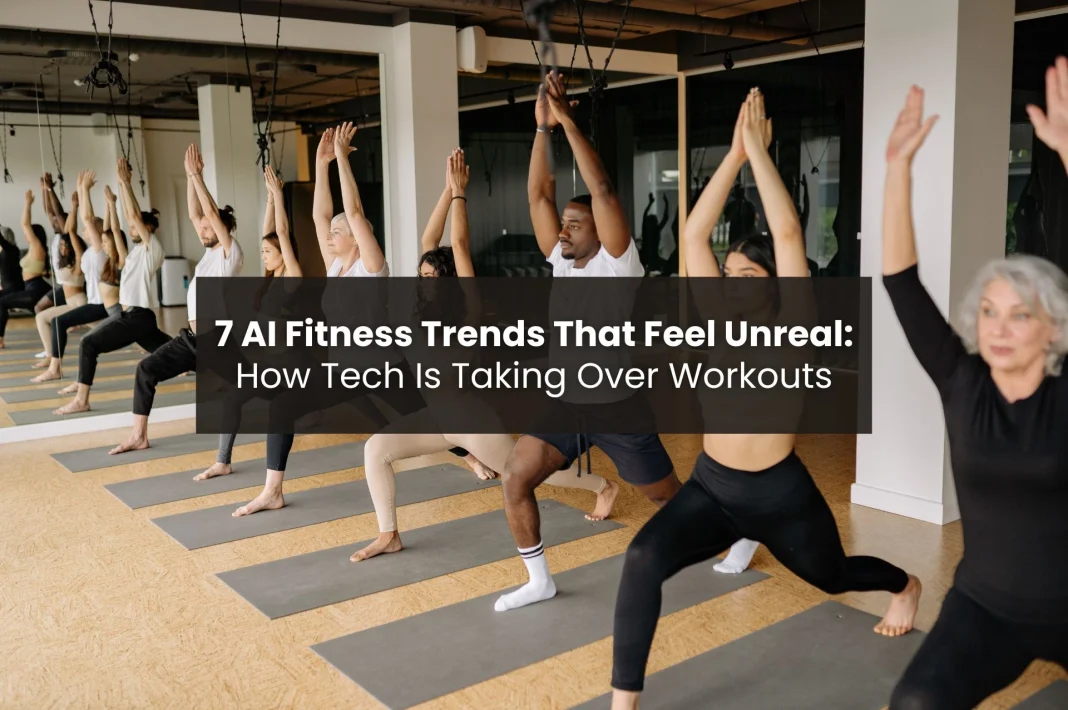Fitness has always been More than Just Physical
By 2025, fitness is not just about gyms or heavy weights or even about human trainers. Artificial intelligence will change everything from the way people work out to the way they rest and eat as much as possible. These 7 AI fitness trends in 2025 are changing the fitness world, and even more unexpectedly than the others.
AI Fitness Trends 2025
1. Personalized Workout Plans that Change with Every Movement

Tool: Fitbod
With AI taking the guesswork out of fitness, the Fitbod app for creating personalized strength workouts will personalize the work according to goals, equipment, and progress. The program will keep adapting to a user as he or she improves.
Pricing: Free limited access; $14.939 per month or $86.39 annually
Why it changes the game: It provides evidence-based modeling for progression and muscle recovery tracking.
2. Virtual Coaches That Feel Truly Human

Tool: Freeletics
AI-taught personal trainers have come to replace live personal trainers. Creating workout schedules based on fitness level, feedback, and mood-like responding in real-time like a coach would, that is Freeletics.
Pricing: $1.54/week for 3 months; $0.96/week for 12 months.
Why it changes the game: Smart, no-equipment workout with motivational support.
3. Wearables That Have More Knowledge Than a Doctor

Tool: Oura Ring 4
These fitness wearables are transforming into holistic body scanners. The Oura Ring observes sleep patterns, heart rate variability, and stress to advise when to exercise and when not to.
Pricing: $349 for Silver or black Ring
Why it changes the game: Readiness Score based on daily biometrics and recovery data.
4. AI That Accepts You Staying On Track With Healthy Eating

Tool: Noom
Nutrition-wise, AI is as big a deal as exercise. Noom assesses food intake, tracks behavior, and guides individuals in healthy habits, weighing emotional and lifestyle factors.
Pricing:
- Noom Weight & Programs: $17.42/month for 12-month plan (7-day trial), Noom Microdose GLP-1Rx starting at $119, Noom GLP-1Rx starting at $149, Noom Med starting at $69 (medication extra).
- Noom HRTRx: Menopause-focused HRT program, options starting at $69 to get started.
Why it changes the game: It sustains long-lasting modifications in dietary habits through the medium of mindset training.
5. Immersive VR Workouts That Make Gyms Seem Like Nada

Tool: Supernatural
VR + AI = a full-body workout with lots of excitement. Supernatural provides guided workouts in fantastic locations while varying the workout intensity to match performance in real-time.
Pricing: A monthly membership at $9.99 USD + Tax (first billing date occurs after a 7-day free trial); An annual membership at $99.99 USD + Tax.
Why it changes the game: Supernatural makes the workouts awesome, competitive, and extra-engaging.
6. Injury Prevention Before You Even Feel Pain

Tool: Kemtai
AI movement analysis already prevents injuries. Kemtai monitors posture and form via webcam and gives live corrections to reduce the risk of long-term injury.
Pricing: Free basic; Pro: $19.99 per month
Why it changes the game: It has found popularity in physical therapy and rehab clinics.
7. Align the psyche with the physique via the AI wellness app Mind Body

Tool: Wysa
Wellbeing has ventured into the mind arena as part of the fitness set. Wysa incorporates AI to mood-track, journal, and guide meditation-all to be mentally firm as people go through their fitness journeys.
Pricing: Free basic version; Premium $50–$100/year; Live therapy $30–$50/session; Some employer/institution plans may cover costs.
Why it changes the game: Mood-adaptive wellness recommendations to manage stress and motivate clients.
The Future of Fitness Is Smart, Personal, and Already Here
From smart rings that know when you need rest, to apps that push your limits or protect your joints, AI is quietly revolutionizing the way we move, train, and recover. These seven trends are just the beginning. What felt futuristic a year ago is now shaping daily workouts for millions.
As AI continues to evolve, it’s not just transforming fitness, it’s redefining how we stay healthy and sharp at every age. If you’re curious about how AI can support your mental clarity, memory, and brain health alongside your physical performance, don’t miss this deep dive on using AI to stay sharp as you age.
In 2025 and beyond, the smartest fitness plan isn’t just about lifting more or running farther, it’s about training smarter with the help of technology that adapts to you.
FAQs
Machine learning algorithms power AI in fitness by analyzing personal data such as workouts, heart rate, sleep patterns, and goals to provide individualized coaching and nutrition recommendations as well as injury prevention strategies and performance tracking. This technology operates within fitness apps and wearable devices while also enabling virtual reality exercise sessions.
While AI apps may not always provide superior results, they frequently present more convenience and affordability as well as consistent support. AI apps deliver continuous support along with immediate changes and performance monitoring, but they do not possess the emotional intelligence or accountability of human trainers.
The top tools for fitness enthusiasts are Fitbod for strength training programs, Freeletics for AI coaching services, Oura Ring 4 for health monitoring, Noom for nutritional guidance, Kemtai for injury prevention methods, and Supernatural for virtual reality workouts.
Yes, as long as it’s used wisely. AI tools function to improve safety through ongoing monitoring of recovery processes and stress levels and evaluating potential injury risks. These AI tools should not be used as a replacement for professional medical consultation and diagnosis.
Prices vary. Fitness platforms such as Fitbod and Freeletics typically cost between $12 and $35 per month. The Oura Ring needs both an initial purchase and an ongoing monthly cost. Numerous applications provide free versions that include restricted functionalities.
